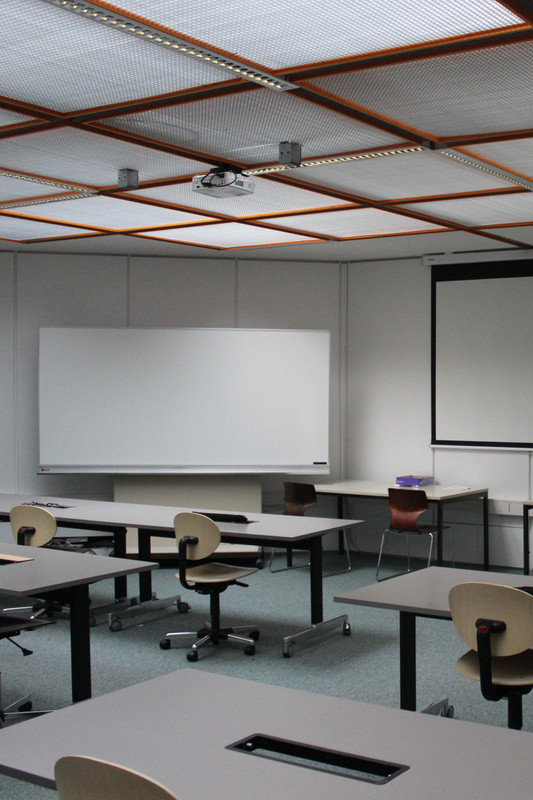After successful completion of the course, students are able to develop a well-founded attitude towards a building worthy of preservation and to justify their proposals for dealing with it.
Firstly, students learn the ability to comprehensively analyse an existing building: In addition to the urban planning, functional and structural characteristics, the artistic, cultural and historical significance should also be worked out. On the basis of this analysis, students will be able to make an assessment and determine which components and areas they believe should be preserved, adapted or modified.
Students will also learn how to develop a suitable re-utilisation concept and an architectural design - integrating sufficiency and sustainability aspects - and ultimately incorporate them into the aforementioned consideration process.




Fotos: Anna Oberthanner
Retraining necessary - New ideas for the former MODUL tourism school
The building of the former MODUL tourism school, located at Peter-Jordanstraße 78-80, right next to Türkenschanzpark in Vienna-Döbling, was built from 1973-75 according to plans by architect Josef Fleischer and structural engineer Robert Krapfenbauer. At the time, it was commissioned by the Chamber of Commerce for Vienna (now the Vienna Chamber of Commerce), which used the building as a training centre for the tourism and leisure industry for almost 50 years.
At the time of its opening, the six-storey building housed various classrooms (ground floor, upper floors 1 to 3) as well as a girls' boarding school (upper floor 3) and, due to the practical approach to teaching, a (school) hotel (upper floors 4 to 5) and restaurant (upper floor 2). The building also had a gymnasium in the basement as well as rooms for swimming pools and saunas. At the time, the room programme followed a teaching concept developed by experts and teachers specifically for this new type of school.
Fleischer met the different spatial requirements by designing an octagonal grid system, which is reflected in the modular and variable floor plans as well as the cubature. The centrally symmetrical building was designed as a skeleton structure with a contemporary anodised aluminium curtain wall façade, while the supporting structure consists of reinforced concrete ceilings and octagonal reinforced concrete columns. The resulting large spans allowed for a free and flexible room layout during use. Numerous movable wall elements were used for this purpose, particularly in the training rooms.
Despite various conversions (particularly in the 1990s and 2000s), many of the building's interior and exterior characteristics have been preserved to this day. The former MODUL tourism school is therefore a remarkable and unique building that is one of the few remaining buildings in Austria built in the spirit of structuralism.
With the MODUL tourism school moving out in September 2023, the building now faces an uncertain future. Despite its numerous listed features and decades of continuous use, the building was recently considered "out of date" as a training centre for the Vienna Chamber of Commerce. In addition to the unconventional floor plan organisation and choice of materials typical of the time, the high degree of mechanisation in particular contributed to this assessment. At the time of the opening, the building's technical equipment included a television studio, photo lab and graphics office (all for the creation of in-house teaching programmes), a mechanical ventilation and air conditioning system, a fully automatic waste processing system, an emergency power generator and a water treatment plant. All monitored and controlled by a centralised building automation system. It cannot be denied that this large number of systems had recently become outdated and had reached the end of their service life. And even with a view to future reutilisation, dealing with them will be a major challenge.
A complete gutting or even demolition of the building could therefore be easily justified. And the Vienna Building Code does not oppose a possible demolition of the building (not a listed monument, not part of a protected zone and built after 1945). However, a different strategy is to be pursued with the design in the summer semester of 2024 due to the building's listed status, but also for sustainability reasons: Proposals for preservation will be sought, and a "retraining" of the building will be necessary in the process.
Introduction: Tuesday, 05.03.2024, 14:00; seminar room 257
Correction dates: Tuesdays between 14:00–19:00; seminar room 257
Exception: Tuesday, 12.03.2024, 9:00–13:00, seminar room Argentinierstraße and Tuesday, 19.03.2024, 9:00–16:00, Peter-Jordan-Straße 78–80
Excursion: The course is linked to the excursion (LVA 251.194)
In a compulsory excursion from 8 to 12 April 2024 in Vienna, mainly administrative and office buildings of post-war modernism will be visited.
The arrival and departure are to be organised and paid for by the students themselves.
Miscellaneous:
The design course will be held in German.
This course is part of the initiative of the 2023/24 annual theme "Transformation of the Existing". Further information and an overview of all participating LVAs can be found at the following link https://futurelab.tuwien.ac.at/jahresthema-2023-24